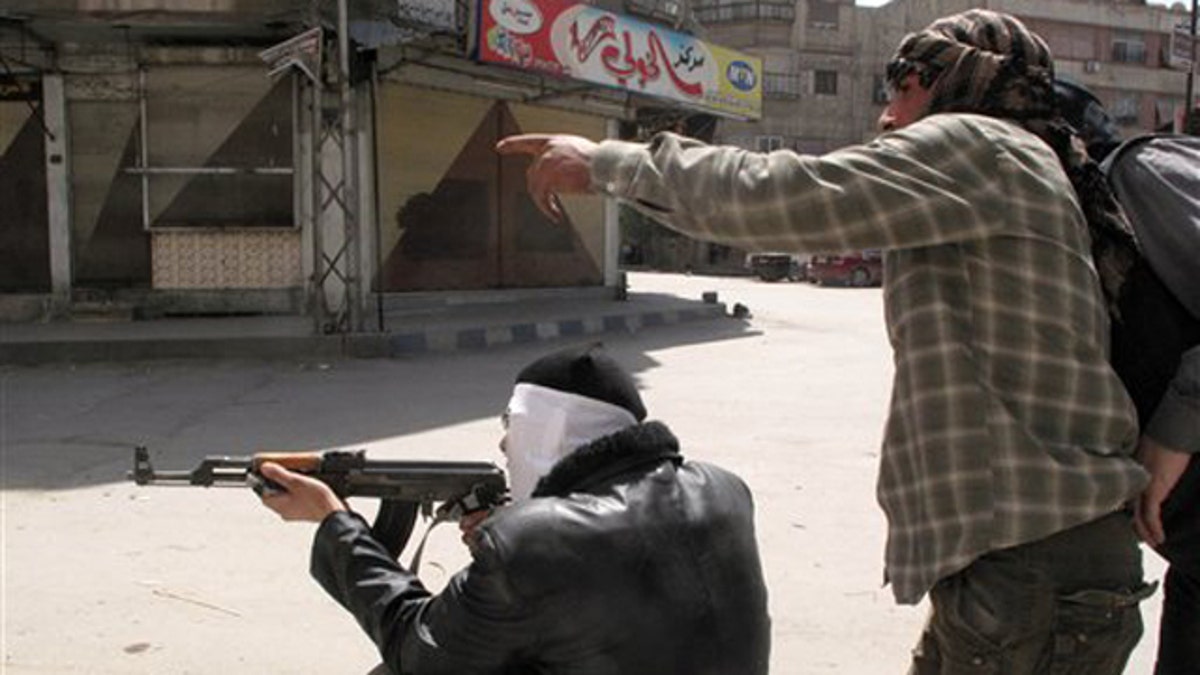
April 6, 2012: In this photo, Free Syrian Army fighters try to spot a sniper during fighting with Syrian troops in a suburb of Damascus, Syria. (AP)
BEIRUT – Syrian troops resumed their shelling of residential neighborhoods dominated by rebels in the central city of Homs Sunday, activists said, after the U.N. Security Council voted to dispatch the first group of monitors to the country to shore up a shaky truce.
The reported shelling is threatening the cease-fire to which President Bashar Assad and rebels fighting to topple him had agreed. Both sides accuse each other of violating the truce at the center of international envoy Kofi Annan's peace plan.
The Local Coordination Committees activist network said shells falling at the rate of six each minute shook the neighborhood of Khaldiyeh for the second consecutive day. There was no immediate word on casualties.
Syrian troops shelled residential neighborhoods of Homs Saturday in the first use of heavy weapons since the cease-fire officially took effect Thursday. Rebels were reported by the state media to have fired rocket-propelled grenades.
In an amateur video posted on the Internet by activists Sunday, explosions and gunfire can be heard echoing as Khaldiyeh's skyline is engulfed in gray smoke. Homs-based activists said other districts including Bayada, Jouret el-Shayah, Qarabees and Qusour were also being bombarded.
The regime restricts access of foreign observers, including journalists, making it difficult to verify reports of violence independently.
Saturday's resolution gave the 15-nation Security Council its first united front since the uprising against President Bashar Assad began 13 months ago. It called for immediate deployment of up to 30 monitors, to be followed by a larger contingent of up to 250 once the situation has stabilized.
Emphasizing that both sides must halt the violence that has killed more than 9,000, the council called on Syria to pull soldiers and heavy weapons out of towns and cities -- a truce provision Assad's regime has ignored. It also demanded urgent compliance with Annan's six-point plan intended to lead to talks between the regime and the opposition on Syria's political future.
The plan is widely seen as the only remaining chance for diplomacy, mainly because it has the backing of Syria allies Russia and China which shielded Assad from Security Council condemnation in the past.
Annan said in Geneva that he was "very relieved and happy" about the council vote.
Secretary-General Ban Ki-moon also welcomed the resolution.
"I will make sure that this advanced observer mission will be dispatched as soon as possible and try to make concrete proposals by eighteenth of April for an official observer mission," he said.
Western powers and opposition leaders remain skeptical about Assad's willingness to ease his tight grip on the country, ruled by his family for four decades. The regime appears to have complied with parts of the Annan plan, while flouting others.
With the exception of Homs, an opposition stronghold pounded by daily regime shelling in the three weeks leading up to the cease-fire, the military has halted random shelling and mortar attacks on rebel-held residential areas, which were the daily norm in recent weeks. However, it has maintained an intimidating presence of troops, tanks and plainclothes security agents in the streets and demanded that anti-government protesters seek permits, despite Annan's demand that peaceful gatherings be allowed.
